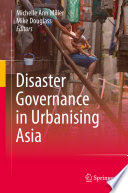International Conference Presentations, January-June, 2013:
Walsh, John and Lavanchawee Sujarittanonta, “Business Strategies and Development of the Trading Card Games Industry,” paper presented at the Participatory and Popular Culture 2013 Winter Conference (Taipei: January 30th-February 4th, 2013). https://sites.google.com/site/ppc2013winter/schedule-1
Sujarittanonta, Lavanchawee, John Walsh and Stephen Cheng, “Gambling and Social Well-being in Asian Culture in the Eyes of Impressionable Youths,” paper presented at the Participatory and Popular Culture 2013 Winter Conference (Taipei: January 30th-February 4th, 2013). https://sites.google.com/site/ppc2013winter/schedule-1
Chintraruck, Alin and John Walsh, “The Allocation of Water Resources to Competing Interests: The Case of Thailand,” paper presented at the SIU International Conference (January 30-31st, 2013).
Sinthuyont, Warita and John Walsh, “Social Entrepreneurship, Environmentalism and Personal Commitment to Change,” paper presented at the SIU International Conference (January 30-31st, 2013).
Thakur, Reema and John Walsh, “Western, Buddhist and Hindu Women Entrepreneurs: What Are the Differences?” paper presented at the SIU International Conference (January 30-31st, 2013).
Walsh, John, “Governance Systems of Special Economic Zones in the Greater Mekong Subregion,” paper presented at the SIU International Conference (January 30-31st, 2013).
Lovichakorntikul, Petcharat and John Walsh, “A Comparative Study of the Corporate Social Responsibility Systems of the Samrong General Hospital and Vibhavadi Hospital, Thailand,” paper presented at the SIU International Conference (January 30-31st, 2013).
Sujarittanonta, Lavanchawee and John Walsh, “Game-Playing Culture of Young Taiwanese in the Age of Capitalist Consumption,” paper presented at the SIU International Conference (January 30-31st, 2013).
Walsh, John, “Overview of Health Management in Thailand: The Role of Clinical Governance,” paper presented at the SIU International Conference (January 30-31st, 2013).
Putthithanasombat, Phramaha Min and John Walsh, “The Buddhist Perspective of International Labour Management: A Case Study of Laotian, Myanmar and Cambodian Labour in the Service Industry in Thailand,” paper presented at the SIU International Conference (January 30-31st, 2013).
Ngamsang, Sirirat and John Walsh, “Overseas Educational Institutions as Instruments of Soft Power: A Comparison of Chinese, British, French and German Approaches,” paper presented at the SIU International Conference (January 30-31st, 2013).
Nithisathian, Kittichok and John Walsh, “Purple Ocean Strategy Concept Paper: Content Analysis from Interviews and Literature Review,” paper presented at the SIU International Conference (January 30-31st, 2013).
Jha, Dilip Kumar and John Walsh, “Contribution of Livestock to Rural Households in a Nepalese Village,” paper presented at the SIU International Conference (January 30-31st, 2013).
Che Rusuli M.S., Tasmin R., Takala J. Norazlin H., K Phusavat and Walsh J., “Relationship between Knowledge Management Practices and Library Users’ Satisfaction: A Preliminary Result of Malaysian University Libraries,” paper presented at the 2013 TIIM Conference (March, 2013: Phuket).
Ngamsang, Sirirat and John Walsh, “Confucius Institutes in Thailand: Modes of Internationalization of Chinese Soft Power,” paper presented at the IGCBE International Conference 2013 (First Hotel, Bangkok, February 9th-10th, 2013).
Walsh, John and Wilaiporn Lao-Hakosol, “Industrial Estates and the Changing Economic Geography of Asia,” paper presented at the IGCBE International Conference 2013 (First Hotel, Bangkok, February 9th-10th, 2013).
Lovichakorntikul, Petcharat and John Walsh, “Dharma Teaching in a High-Tech Hospital Environment,” paper presented at the IGCBE International Conference 2013 (First Hotel, Bangkok, February 9th-10th, 2013).
Thakur, Reema and John Walsh, “Balancing Family Life and Personal Ambitions: Western, Buddhist and Hindu Female Entrepreneurs,” paper presented at the IGCBE International Conference 2013 (First Hotel, Bangkok, February 9th-10th, 2013).
Walsh, John, “Minimum Wage Systems in East Asia,” paper presented at the IGCBE International Conference 2013 (First Hotel, Bangkok, February 9th-10th, 2013).
Walsh, John, “Social Policy and Special Economic Zones in the Greater Mekong Subregion,” paper presented at the Asian Consortium for Social Policy Conference (Bangkok, May 2nd-3rd, 2013).
Chintraruck, Alin and John Walsh, “Water Allocation Issues in Thailand,” paper presented at the 2nd EnvironmentAsia Conference (Pattaya: May 15th-17th, 2013).
Walsh, John, “Economic Policy under the Pheu Thai Government of Thailand, 2011-3,” paper presented at the ICGBE International Conference 2013 (First Hotel, Bangkok, June 21-22nd, 2013).
Thakur, Reema and John Walsh, “Space and Workplace Issues for Nepalese Female Entrepreneurs,” paper presented at the ICGBE International Conference 2013 (First Hotel, Bangkok, June 21-22nd, 2013).
Jha, Dilip Kumar and John Walsh, “Seasonal Labour Migration from a Rural Nepalese Village,” paper presented at the ICGBE International Conference 2013 (First Hotel, Bangkok, June 21-22nd, 2013).
Ngamsang, Sirirat and John Walsh, “Sino-Thai Relations in Historical Perspective: The Implications for Contemporary Organizational Management,” paper presented at the ICGBE International Conference 2013 (First Hotel, Bangkok, June 22-23rd, 2013).
Putthithanasombat, Pramaha Min, Petcharat Lovichakorntikul, Sirirat Ngamsang and John Walsh, “Cross-Border Exchanges in the Western Mekong Region: The Role of Monks and the Laity,” paper presented at the ICGBE International Conference 2013 (First Hotel, Bangkok, June 22-23rd, 2013).
Pinyochatchinda, Supaporn and John Walsh, “Consciousness of Social Responsibility at the Map Ta Phut Industrial Estate and Pollution Management,” paper presented at the ICGBE International Conference 2013 (First Hotel, Bangkok, June 22-23rd, 2013).



